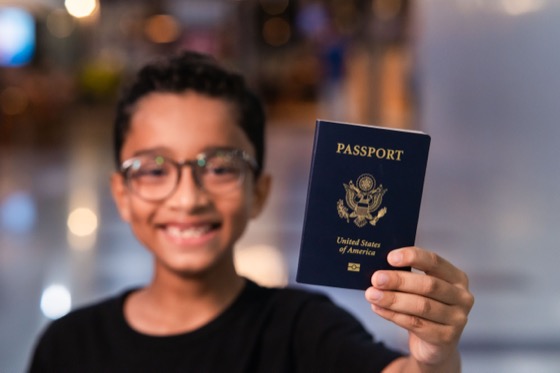 Getting passports for minors requires some extra steps that are not
necessary when applying for an adult passport. These requirements are
established in order to guarantee the safety and well-being of the
minor.
You will find answers to the most frequently asked questions
below. If you do not find the answer to the question you have, please
contact us.
Getting passports for minors requires some extra steps that are not
necessary when applying for an adult passport. These requirements are
established in order to guarantee the safety and well-being of the
minor.
You will find answers to the most frequently asked questions
below. If you do not find the answer to the question you have, please
contact us.
The Children's Passport Issuance Alert Program
The Children's Passport Issuance Alert Program (CPIAP) is a very important resource that was created to prevent international parental child abduction. CPIAP allows parents to register their U.S. citizen children under the age of 18 in the Department of State's Passport Lookout System. The parent or parents receive an alert from the Department of State if an application is submitted for a child that is registered in the program.
The passport lookout system gives all U.S. passport agencies as well as U.S. embassies and consulates abroad an alert on a child’s name if a parent or guardian registers an objection to passport issuance for his or her child. This procedure provides parents advance warning of possible plans for international travel with the child.The responsiblity to administer the CPIAP program lies with the U.S. Department of State's Overseas Citizen Services Children's Issues. Contact information is provided below.
U.S. Department of State
Overseas Citizen Services, Children's Issues
Attn: Children's Passport Issuance Alert Program
SA-17, 9th Floor
Washington, DC 20522-1707
E-mail: PreventAbduction1ATstate.gov
Phone: 1-888-407-4747
Fax: 202-485-6222
Who can request a child be entered into CPIAP?
Usually a parent requests that his/her child or children be entered into the program. Sometimes both parents will separately submit a request. Requests may also be submitted by law enforcement or a court, or someone acting in behalf of a parent such as an attorney, a member of Congress, or another family member. All requests for entry of a child into the program must be in writing and signed.
It is necessary for a parent/guardian to have legal custodial rights to the child in order to request that the child be entered in CPIAP. Such evidence may include a copy of the child's birth certificate or other proof of parentage; for example, a court order from a court of competent jurisdiction granting custodial rights or legal guardianship of the child.
REMEMBER: Only U.S. Citizen children under the age of 18 can be entered into CPIAP.
Does entering a child's name into CPIAP always prevent a passport from being issued?.
Entering a child's name into CPIAP does not guarantee that a child will not be issued a passport. The parent who requests entry of his/her child into the program may consent to issuance of the passport after receiving notification of the passport application. It is also possible for a passport to be issued to a child under 16 without consent of both parents (or legal guardian), if the applicant for the passport can establish that consent of both parents is not required under Federal law (22 CFR 51.28).
A court order providing the applicant parent or guardian with sole custody of the child, or a court order specifically authorizing the applicant parent or guardian to travel with the child, for example, would allow the Department to issue a passport without the consent of another parent or guardian. This is true even if the child has been entered into CPIAP.
If a passport application is executed on behalf of a child entered into CPIAP, the parent who requested the alert will receive notification of the passport application and will generally receive 30 days to consent or object to issuance of the passport, absent extraordinary circumstances. However, if the applicant can demonstrate that he/she has sole authority to apply for a passport under U.S. law, the passport may still be issued at any time.
How Do I Enter My Child into CPIAP?
To enter your child into CPIAP, you must submit three items to the Department of State's Passport Services.
1. Completed Entry Request Form
2. Proof of Your Identy (Your driver’s license or other identity card)
3. Birth Certificate or Documentation that Shows Your Legal Parentage/Guardianship (Hospital issued certificate or Consular Report of Birth Abroad)
E-mail, fax, or mail these three items to Overseas Citizen Services, Children's Issues (contact information above).
A
child is automatically removed from CPIAP when he/she reaches the age
of 18. In the event a parent wants to remove a child or children
from CPIAP prior to reaching age 18, the parent must submit a photo ID and a notarized statement requesting the removal from the program. Only the parent or entity who requested the child’s entry into the program can
request the child’s removal from the program.
IMPORTANT:
It is very important that parents keep Passport
Services informed in writing of any changes to contact information
and legal representation. Failure to notify Passport Services of a
current address may result in a passport issuance for your child
without your consent.
What if my child already has a passport?
You may enter your child's name into CPIAP even if he/she already has a passport. This will allow the Department of State to notify you if Passport Services receives an application for renewal of the passport.
The Department may not revoke a passport that has already been issued to the child. There is also no way to track the use of a passport once it has been issued, since the United States does not have exit controls for people leaving the U.S. If your child already has a passport, and you fear the other parent may abduct your child from the United States, ask a court or your attorneys to hold it.
What if my child has a passport from another country?
Many United States citizen children who fall victim to international parental abduction possess dual nationality. While the Department of State will make every effort to avoid issuing a United States passport without the consent of both parents, the Department cannot prevent other countries from issuing their passports to children who are also their nationals. You can, however, ask a foreign embassy or consulate in the United States not to issue a passport to your child.
Send the embassy or consulate a written request, along with certified complete copies of any court orders you have which address custody or the overseas travel of your child. In your letter, inform them that you are sending a copy of this request to the United States Department of State.
If your child is only a United States citizen, you can request that no visa for that country be issued in his or her U.S. passport. Just keep in mind that no international law requires compliance with such requests, although some countries may comply voluntarily.
IMPORTANT:
The United States government does not have exit controls at the border.
The U.S. government does not check the names or the documents of
travelers leaving the United States. If your child has a valid passport
from any country, he or she may be able to travel outside the United
States without your consent.


